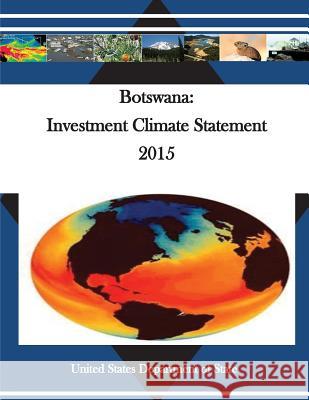Botswana: Investment Climate Statement 2015 » książka
Botswana: Investment Climate Statement 2015
ISBN-13: 9781530699995 / Angielski / Miękka / 2016 / 24 str.
Botswana is a land-connected country located in Southern Africa. Botswana has historically enjoyed among the highest economic growth rates in the world and its export-driven economy is highly correlated with global economic trends. Development has been driven mainly by revenue from the diamond industry, which has enabled Botswana to provide infrastructure such as transportation and social services. During the 12 months prior to September 2014, Botswana's economy grew by 4.2 percent and inflation remained at the bottom end of the central bank's 3 percent to 6 percent spectrum. According to Government of Botswana (GOB), investments within Botswana totaled USD 4 billion in 2012. In accordance to the World Bank's rating scale, Botswana's per capita income of USD 7,730 makes it higher than most other sub-Sahara countries. As of December 2014, Moody's and S&P rate Botswana's sovereign debt as A2 and A-, respectively. Botswana is a stable, democratic country with an independent judiciary system. It maintains a stable macroeconomic environment, fiscal discipline, a well-capitalized banking system, and a sensible crawling peg exchange rate system. Corruption in Botswana remains less pervasive than in other parts of Africa; nevertheless, foreign and national companies have commented an increasing tender-related corruption where colluding officials manipulate the process. The GOB has launched initiatives to promote foreign investment in key sectors in order to diversify its economy beyond diamond industry and it created the Botswana Investment and Trade Centre to assist local and foreign investors in this endeavor. Botswana is a member state to both the ICSID convention and the 1958 New York convention. Despite a commitment towards attracting investment, GOB policies do not always facilitate foreign business operations in Botswana. Currently they do not have a consolidated legal framework that clarifies the protections and incentives afforded to investors and there are limitations on foreign participation in the market. At least twenty different service sector businesses are reserved for nationals. Complimentary to this are the institutionalized preferences of procuring goods and services from citizen-owned sources. Managers cite local skills deficits, low labor productivity, and challenges obtaining work permits for foreign workers as key business constraints in Botswana. Bureaucratic hurdles and shortages of water and electricity also hamper economic activity in Botswana and the government's increasing number of state-owned enterprises (SOEs) and market holdings crowd out the private sector. The GOB is seeking to improve its customs and procurement processes with assistance from USAID, and the U.S. Trade and Development Agency. The World Bank ranked Botswana 74 out of 189 economies in the category of Ease of Doing Business. Key investment opportunities include large water, electricity, transportation, and telecommunications infrastructure projects that the GOB has plans to implement. The lion's share of economic activities outside the diamond sector are driven by government procurement and the GOB has an approximate USD 5 billion budget for the 2015 fiscal year. Economic experts have noted that Botswana has considerable potential in areas such as; mining beneficiation, electricity, meat industry, tourism, and financial services sectors.
Zawartość książki może nie spełniać oczekiwań – reklamacje nie obejmują treści, która mogła nie być redakcyjnie ani merytorycznie opracowana.











